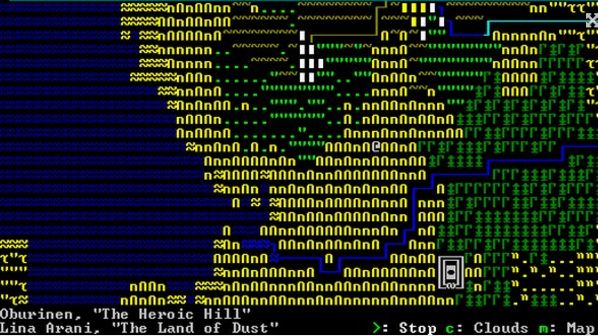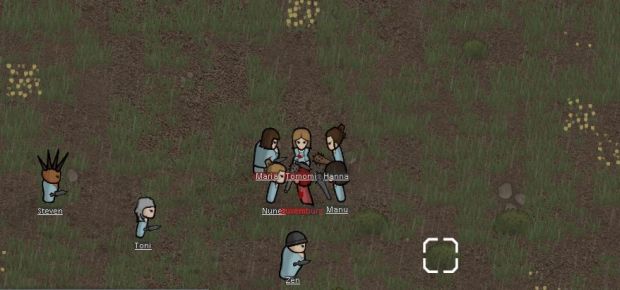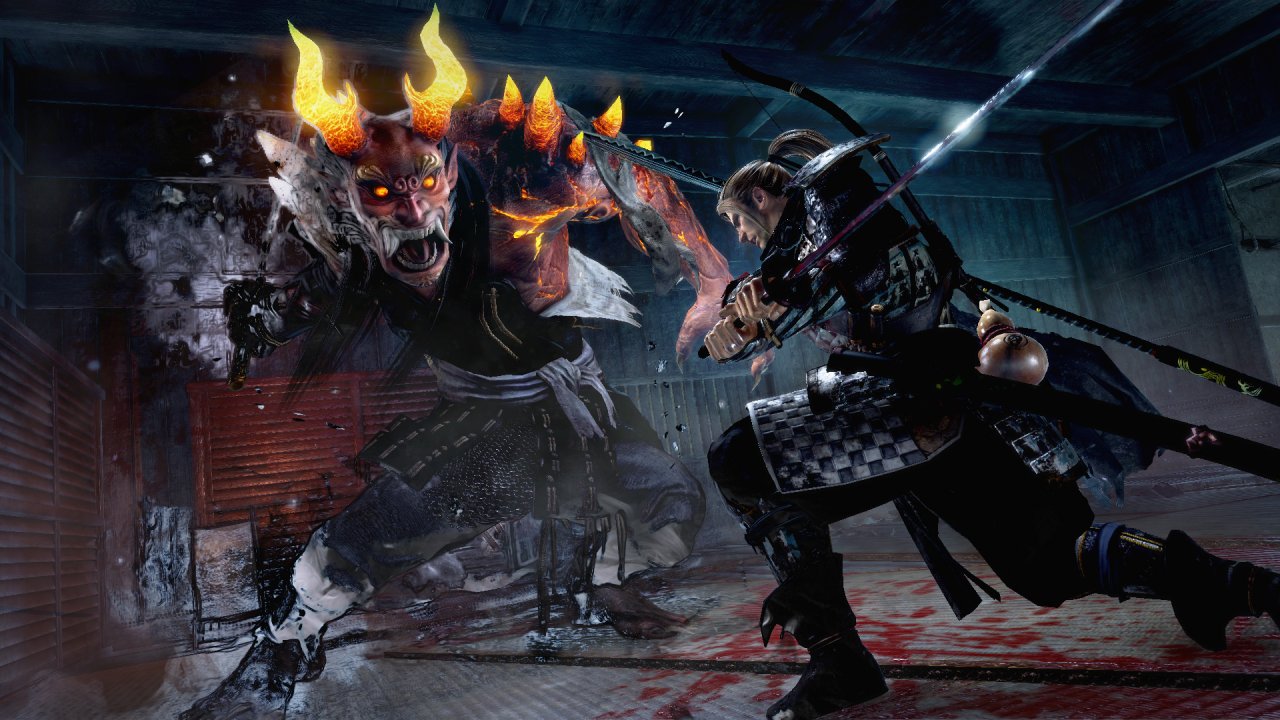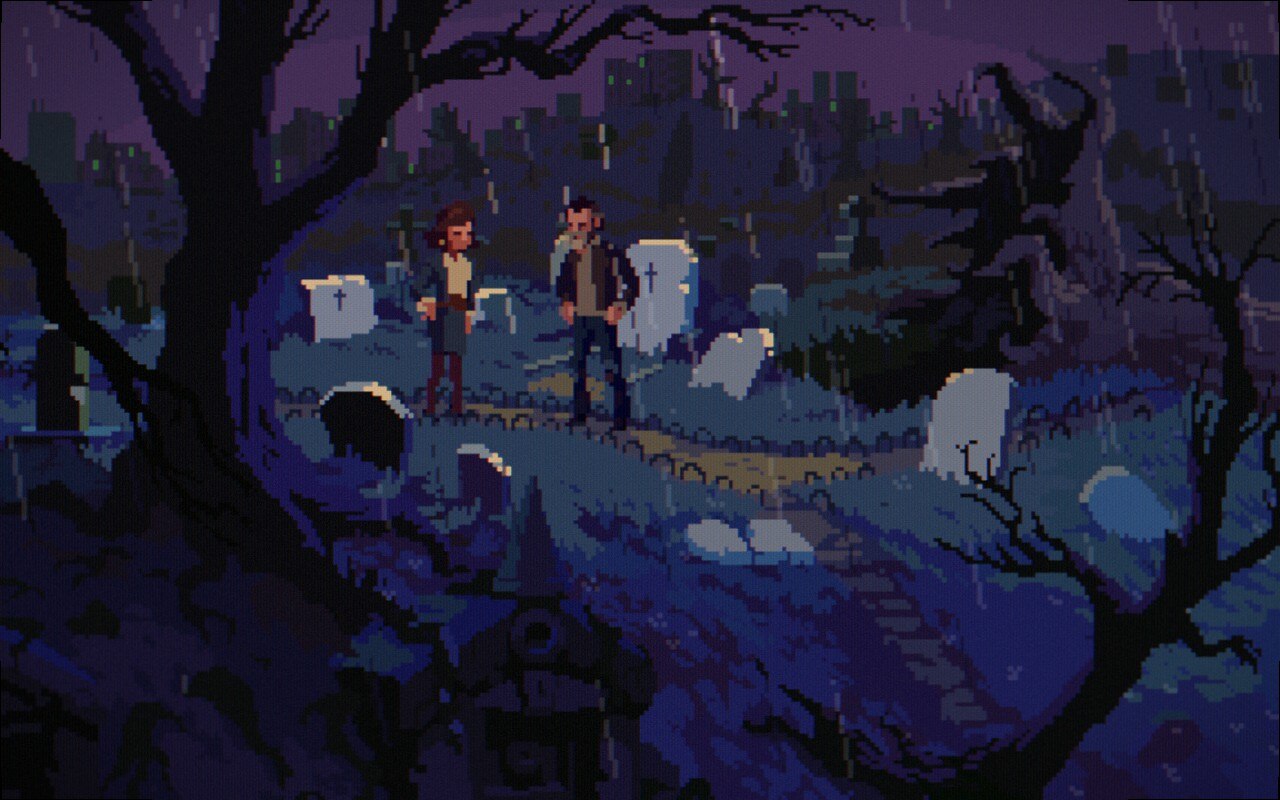The creator of Dwarf Fortress doesn't really like to play games like Dwarf Fortress
He hasn't played RimWorld. What does he play instead? Dark Souls.

If you've only read stories about Dwarf Fortress and have never played the PC's most insanely complex ASCII sim, you may not know that it offers two very different ways to play. The more popular is Fortress mode: the colony management sim you've read about, in which you issue commands to your society of dwarves to build up and maintain a thriving fortress. There's also Adventure mode, which lets you roleplay as a character at the ground level of that simulated world. It's a little bit like playing an 80s RPG, only within an insanely detailed world. As it turns out, Adventure mode—which creator Tarn Adam told me "isn't even a good game" yet—is the whole reason Dwarf Fortress exists at all.
Adams wanted to develop a game that would let him experience randomly generated fantasy stories, like the sword and sorcery movies he grew up with. That goal eventually led him down the path of a deep, deep simulation, and the colony management sprung naturally out of that. In the first part of our interview, Adams and I talked about his plans to simulate magic and the creation of the world in incredible detail.
In part two, we talk about how Dwarf Fortress started with Adventure mode, why he hasn't played any games inspired by Dwarf Fortress, and why he's been playing the Souls games instead.
Wes Fenlon, PC Gamer: Did you ever think about trying to get a publisher for Dwarf Fortress? I know it's essentially anathema to the design of the game. Did the thought ever even cross your mind?
Tarn Adams: The thought never crossed my mind in the sense that I would do it. Of course, you could think, what does that even mean, and ponder. It's just so ridiculous that you can't even think about it reasonably. [laughs] Well, except, 'I could put graphics in the game, and do this, and then suddenly that's this multi-year project that you're not interested in…' And then you shop something around that they probably wouldn't be interested in, anyway, even if you did put some kind of gloss on it, because it's so inaccessible.
I guess there have been counter-examples, a number of successful colony management type games, now.
Let's talk about some of those. RimWorld is probably the most well-known currently. Have you played RimWorld at all?
Keep up to date with the most important stories and the best deals, as picked by the PC Gamer team.
No, no. I've spoken to [RimWorld developer] Tynan a couple times. I know the basic idea. It is a little odd—I've never played any of the games that have said they have something to do with Dwarf Fortress. It just feels weird. I don't know.
Feels weird to play them?
Yeah. I can't quite quantify. Because I could go back and play Caesar III or Tropico or something, these Dwarf Fortress-feeling games that came out before. But if you're playing a game that came out after—no one's really lifting stuff, and that's not how it feels, so it's not that. I don't know. I just don't want to feel my DNA in anything, or something. It's just weird. It would be nice to be articulate about this. [laughs]
Yeah, I don't know. I don't know if there's some phenomenon like that, where people don't like listening to stuff that said 'you influenced me.'
Part of it might be, I'm not sure the Dwarf part of Dwarf Fortress is a game I'd play, necessarily. Colony management, in general. That kind of came out of a weird sequence of events. We were really interested in this narrative simulator and stuff, but the economic feel of it, the survivalist feel of it, is not something we're interested in.
So the Adventure mode was your original goal?
Yeah, that was the original plan. We were writing this horrible game, the 3D one. It's just the strangest game in the world. It's not a game. Not anything. But that didn't come together, so this random side project suddenly becomes our fantasy game. And it's been strange to adapt to that. It's been good in the long run, obviously, for whatever reason. And probably better for our social simulations to have so many agents, dwarves, running around at the same time. It forced us to consider things that we were not doing down at the scale of one person looking through one person's eyes. So I think it really helped the simulation that we did do this. But it doesn't mean this is the sort of game we were ever playing.
My brother actually does play more than I do, and he was more into things like Tropico, and stuff. So it made sense, it's not like we hate [that style of game], but I would never pick up RimWorld or Gnomoria, or even things like Prison Architect that have kind of mentioned Dwarf Fortress. It's odd, it's really odd that it's not my thing. I don't get it.

Sounds like it's less that it bothers you they might've drawn inspiration from Dwarf Fortress, and more that the parts they took from Dwarf Fortress aren't the parts you like to play.
Yeah, that's most of it. It is a little weird to see in some of these games, something that looks like a Dwarf Fortress description, or something, in some way or another, and you can tell where they drew the inspiration from. It's no more than any other game developer, and I've drawn inspiration the same ways. If you look at my forgotten beast, randomly generated creatures, you'd just go oh, Starflight. It goes the other way too. But I still feel weird playing a game and seeing callouts to my stuff. It's just weird.
I guess this would be hard if you haven't played them, but are there aspects of them you know of that make you go 'oh, why didn't I think about that?' I feel like for a lot of creators, if you're drawing inspiration from something, you're like oh I love this game, but I I could do this better...
Exactly. We cast a long shadow in a sense, because there are certain things we've just done to death. But there are certain things we didn't touch, for whatever reason. We haven't done much with fire, we haven't done much with how the wind works, say, or how trading works. Merchants can come to your city, but you can't send them out. RimWorld has this caravan thing throughout. I don't know the scope of it, if it's the entire world. But there's some kind of trading thing you're participating in.
Without having played it I can't say oh wow, they've done a great thing here, but they've got more than I do, and there are certainly going to be a lot of good ideas in what they're doing. And some of it, I can't speak to the developer of any particular game, what their impulses were, but you get a sense that to escape the shadow of what we've done, they do the things we haven't done. So you get a lot of interesting games that do escape the shadow of Dwarf Fortress.
If you were just to write a dwarf fortress simulator, it wouldn't distinguish itself very easily. But something like RimWorld, which is just a completely different setting, Prison Architect is a completely different setting, they move beyond what we've done very quickly. I'm sure there's a lot to learn. Probably remiss not just powering through the games and playing them. I probably will at some point if I think to do it. It's not like I'm short things to do though, right? I have a giant task list already. It's hard to balance all these things out.
It's still a shock. People are playing a text game. That's weird.
Tarn Adams
It's the same attitude I have with computer programming, which is probably not healthy. I should be out learning algorithms and stuff, learning the proper data structure to use. I just had one of these AI talks where they were yelling at me—without yelling at me specifically, but I was within the collection of people being yelled at—for some of my habits. I just can't shape it. I feel like my mind has been spoken for in terms of what I can do to adjust my behavior and still keep my motivation up. Some things I just don't like to do, which is childish, but I'm doing okay. It's all right, I think.
I want to go back to Fortress mode. Was it surprising to you that when you first put the game out, that became the better known version of Dwarf Fortress? I don't know the breakdown, but I'm guessing more people play the fortress simulation.
Oh, absolutely. The Adventure mode isn't even a good game. Whether you think Dwarf Fortress is a good game or not, it's a game, and people can play it. Adventure mode is still amorphous. It's kind of funny, we never achieved our original goals, right, with a simple RPG. There's no real feel of a game loop at all, where you're accomplishing things. You do have these reputations that build up, but you never quite feel like you've changed the world and that it's carrying on.
Whereas in Dwarf Fortress you do that pretty quickly. So it wasn't surprising that that's the mode they liked, because it's the only one that's a game. It was surprising that they liked it, period. And to the extend that we've blown up. It's still a shock. People are playing a text game. That's weird.
This is a total change of topic, but we didn't talk about Dark Souls last year, did we? Have you played Dark Souls?
Yeah, I played Demon Souls, Dark Souls, Dark Souls 2, Dark Souls 3, Bloodborne, and Nioh.
Do you call yourself a Dark Souls fan?
Sure. Yeah. Dark Souls 1 more than the others probably. That's a natural opinion, right?
I agree.
It's because of the thing where people say, well, what makes a game like Dark Souls? And they start talking about stuff like difficulty or dying all the time or whatever, and that just has nothing to do with it, to me. I don't consider them that hard, because I can win them, which I can't do with other games in general. I can't win Contra or something. I don't see them as hard. I see them as sort of needlessly repetitive sometimes, really, especially when you have to run all the way back to a place, but the atmosphere is just killer. It's just living in this weird dreamscape thing and just seeing what they did with it. I like the interconnectedness of the things, which is why I was kind of disappointed in these star-shaped maps they had in the later ones.
Just the whole surreal thing. It's the same reason I enjoy Ultima Underworld, being trapped underground, you feel like you're down there by yourself. Then it turns out you're not, that's too bad. There's a big colony of humans of whatever. But just living in this weird dream thing and not knowing what you're going to see when you get to the next boss fight, and you know they've thought about something weirdly creative.
Usually a little terrifying.
Nioh has a slightly different vibe to it. The speed of it was nice in the new one. And the whole ki pulse thing, where you have to think a little bit more about what you're doing. I also got way more use out of items and stuff, because you can flip your four-direction thing so you have eight available. I found myself planning what is in every single one of these eight slots, what order am I going to use them in, and then just flip through them like crazy. I don't know if that comes out of the Ninja Gaiden team…

I'm sure there's some influence there.
I thought that was cool. It kind of had a problem with, you were expected to be a little more… good, at boss fights. You had to be perfect sometimes because there's a lot of one-shot stuff, which I don't like. If there were a way to do these games without repetition of boss fights, I don't care about the perfection of skill aspect of it at all, I just want to keep wandering through a weird fever dream. If I didn't ever play that boss again it wouldn't bother me. I'd rather see something else screwed up.
It's interesting you like the first Dark Souls the most but don't like repetition, since it doesn't have nearly as convenient fast travel. I'm of two minds on it. I like the convenience of the fast travel, but I also miss the fact that to get from one place to another you found a new path and you learned the world.
I liked having the map in my head. But it did all wrap on itself so that it wasn't a total nightmare. The other one, if it's shaped like a star, you need fast travel or you're just going to claw your eyes out having to walk all the way back here. You do get fast travel late in Dark Souls, but still, there's like 7 connections back to the original bonfire.
If the atmosphere is especially a big draw for you, is there anything from those games that has given you a different flavor of fantasy to want to draw on, or be inspired by? In terms of modern fantasy settings, those games are the most evocative around right now.
Yeah, well we didn't think about it too much, but we were thinking, if you wanted to make something with such a weird, dreamy… the whole fact that you're resurrecting into this thing is part of the world, right? It's not just a Game Over, start again thing. It's part of this nightmarish groundhog day scenario. How would you implement that in the myth generation system? You could go through and think about how their myths connected up and read the lore sites and stuff, and say, how can we really capture the weirdest thing about this game, which is probably those rebirth mechanics. It's not so much that it's hard to do mechanically, I just have no idea how it would play in a game like Dwarf Fortress. If you don't have the atmosphere to pick it up, does it then just become a really weird playstyle?
We were thinking of having, say you have a more standard world with a regular old afterlife, and you were playing adventure mode, and then when you died it doesn't just say quit and start again. You're actually sitting in the Elysian fields all of a sudden, and you can move around, and you're like, what just happened?
'Ohhh, damnit.' It wouldn't be a long game, because it would probably be boring, but you could chat with some godlike figures and decide if you wanted to go into the pool and reincarnate or go do something, or if you just want to retire and hang out and be dead. And when your other characters die they can talk with you about how you both died stupidly.
It's similar to that, if you died and were kind of reborn. The feeling trapped in that kind of game is kind of against the ongoing flow of history that Dwarf Fortress has, where those things are very tightly cyclic in their historical feel. Even the thing, like I don't know how many people care about Souls spoilers at this point, but if you choose to do certain things with the Flame at the end [of Dark Souls 3], you have choices, but they feel vaguely like choices that have all been made before. No matter what you did, you still feel like you're just continuing.
Dragon's Dogma is the same way. You can stop the story at different points, but you're still on a bigger treadmill. Does that work at all with the Dwarf Fortress system? You can do it more abstractly and just be like, well Dwarf Fortress, this world works in these Hindu cycles of like 700,000 years is this age, and this age is this many years. And that doesn't matter because you're not going to get through one age.
But if your age is like 20 minutes long… it might be interesting to play, but it destroys some of our fundamental systems about story recording that I'm not sure the gameplay experience survives. But who knows. If it's not hard to test, you test it.

Wes has been covering games and hardware for more than 10 years, first at tech sites like The Wirecutter and Tested before joining the PC Gamer team in 2014. Wes plays a little bit of everything, but he'll always jump at the chance to cover emulation and Japanese games.
When he's not obsessively optimizing and re-optimizing a tangle of conveyor belts in Satisfactory (it's really becoming a problem), he's probably playing a 20-year-old Final Fantasy or some opaque ASCII roguelike. With a focus on writing and editing features, he seeks out personal stories and in-depth histories from the corners of PC gaming and its niche communities. 50% pizza by volume (deep dish, to be specific).

